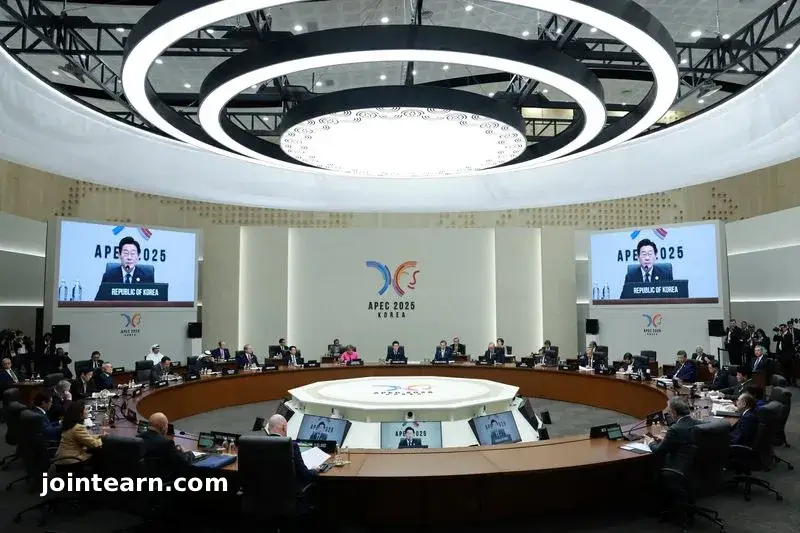
GYEONGJU, South Korea — October 31, 2025 — As global trade tensions cast a shadow over the Asia-Pacific Economic Cooperation (APEC) summit in South Korea, officials expressed optimism that a joint declaration promoting free and open trade could still be achieved.
Carlos Kuriyama, Director of the APEC Policy Support Unit, told Reuters on Friday that member economies remain committed to advancing multilateral cooperation, even as protectionist policies — notably from the United States — continue to dominate headlines.
“Most APEC members continue advocating for free trade,” Kuriyama said during an interview on the sidelines of the two-day summit in Gyeongju. “We heard several presidents, prime ministers, and economic leaders reaffirm that commitment at the forum.”
Push for Consensus Amid Tariff Tensions
Kuriyama’s remarks come as U.S. President Donald Trump’s tariffs and bilateral trade approach have drawn criticism from many of APEC’s 21 member economies. The United States, represented at the summit by Treasury Secretary Scott Bessent, has promoted individual trade deals — such as those recently reached with South Korea and China — rather than the multilateral model APEC was built upon.
Despite the policy divide, Kuriyama said he was confident the summit would produce a unified statement, noting that all member nations “are working around the clock” to finalize the language of the declaration before the summit’s conclusion on Saturday.
“There is clear momentum to achieve consensus,” he said. “Even the U.S. delegation is engaging very actively to ensure a strong, collaborative outcome.”
Asia-Pacific Economies Advocate Free and Open Trade
Kuriyama emphasized that the majority of APEC economies are “moving toward free and open trade”, highlighting the recent upgrading of the China–ASEAN trade pact as evidence of progress toward regional economic integration.
South Korean President Lee Jae Myung, who is hosting this year’s summit, echoed that sentiment during his opening address on Friday, calling for greater solidarity and cooperation amid “a turbulent global order.”
“Cooperation and unity are the only paths toward a more prosperous future,” Lee said, urging APEC members to protect open markets and resist economic fragmentation.
The Gyeongju summit gathers leaders and ministers from the 21 APEC member economies, representing about 61% of global GDP and half of global trade. Kuriyama noted that APEC’s 2025 economic growth is forecast at 3.1%, with a slight moderation to 2.9% in 2026, reflecting steady — though uneven — regional recovery.
Beijing’s Expanding Role and Washington’s Bilateral Focus
Observers note a growing contrast in APEC’s leadership dynamics. As Washington pursues bilateral trade agreements and tariffs under Trump’s “America First” approach, Beijing has sought to position itself as a predictable champion of free trade — a role the U.S. historically occupied.
Kuriyama acknowledged that while bilateral agreements such as Trump’s deals with South Korea and China “reduce barriers and uncertainty”, they also underscore the difficulty of achieving consensus in today’s fragmented trade environment.
“It is very hard to get a consensus nowadays,” Kuriyama admitted. “That’s why like-minded countries are forming smaller groups to advance initiatives more efficiently.”
Still, he stressed that this makes APEC — a non-binding, consensus-driven forum — even more valuable.
“APEC remains an essential space for dialogue,” he said. “Here, leaders can exchange views in a more relaxed, constructive setting — something increasingly rare in global diplomacy.”
Looking Ahead: The Value of Dialogue
As APEC leaders prepare to wrap up their 2025 summit in Gyeongju, optimism remains tempered by realism. The push for a joint declaration reflects both a symbolic and practical test for the forum’s unity at a time when multilateralism is under strain.
Kuriyama’s message, however, is clear: free trade and cooperation remain central to Asia-Pacific prosperity. Even amid tariff wars, political shifts, and rival economic blocs, the APEC platform continues to serve as a bridge for nations seeking common ground.


Leave a Reply